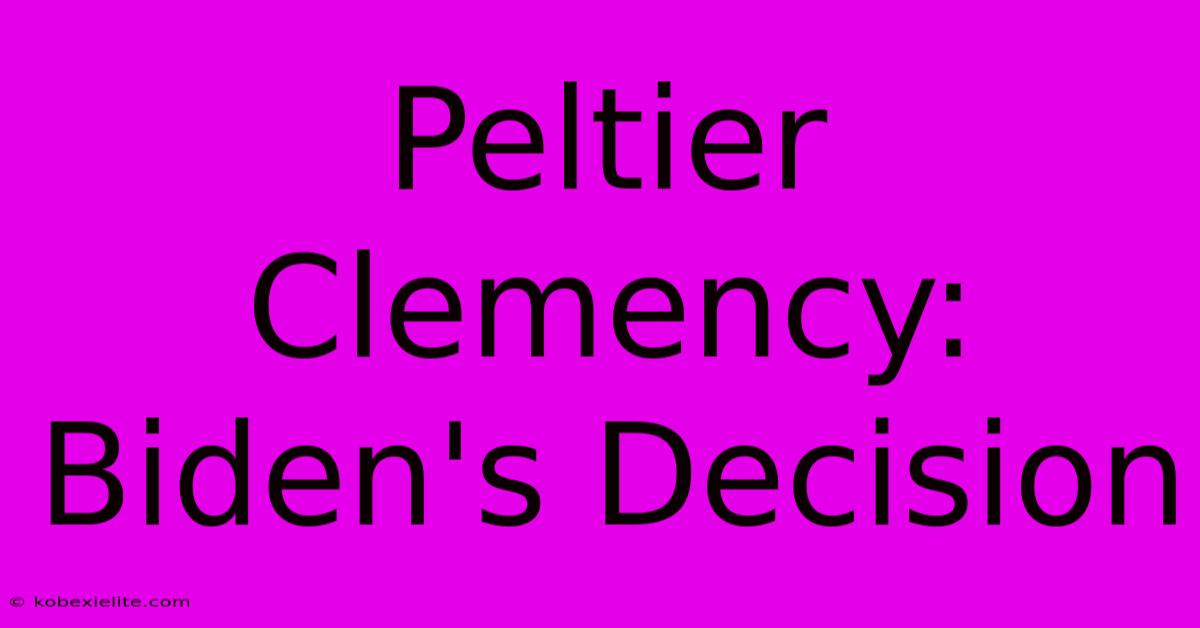Peltier Clemency: Biden's Decision

Discover more detailed and exciting information on our website. Click the link below to start your adventure: Visit Best Website mr.cleine.com. Don't miss out!
Table of Contents
Peltier Clemency: Biden's Decision – A Deep Dive into the Controversy
President Biden's decision to grant clemency to Leonard Peltier has ignited a firestorm of debate. This act, a significant exercise of presidential power, raises complex questions about justice, Native American rights, and the role of executive mercy. Understanding the nuances of this case requires examining its lengthy history, the arguments for and against clemency, and the broader implications of this controversial decision.
The Leonard Peltier Case: A Long and Contested History
Leonard Peltier, a member of the American Indian Movement (AIM), was convicted in 1977 of the murders of two FBI agents during a shootout on the Pine Ridge Indian Reservation in South Dakota. The case has long been shrouded in controversy, with supporters arguing that Peltier was wrongly convicted and that the trial was marred by prosecutorial misconduct and suppressed evidence. Critics, however, maintain that the evidence strongly supports his guilt and that granting clemency undermines the justice system.
Key Arguments for Clemency
Proponents of Peltier's clemency cite several key arguments:
- Questionable Evidence: Many believe the evidence presented at trial was insufficient to prove Peltier's guilt beyond a reasonable doubt. Allegations of coerced testimony and withheld evidence further fuel these concerns.
- Political Motivation: Some argue that the prosecution was politically motivated, targeting AIM activists during a period of heightened tension between the government and Native American groups.
- Humanitarian Concerns: Given Peltier's advanced age and declining health, supporters argue that compassionate release is warranted. They emphasize his lengthy incarceration and the potential for rehabilitation.
- Violation of Native American Rights: Many believe the case highlights a broader pattern of injustice and discrimination against Native Americans within the US justice system.
Key Arguments Against Clemency
Opponents of clemency, however, counter with these arguments:
- Overwhelming Evidence: They contend that despite claims of prosecutorial misconduct, substantial evidence exists to support Peltier's conviction. They point to witness testimonies and forensic evidence as proof of his guilt.
- Respect for the Justice System: Granting clemency, they argue, undermines the integrity of the judicial process and sends a dangerous message that convictions can be overturned based on political pressure or sympathy.
- Victim's Families: The families of the slain FBI agents have consistently opposed Peltier's release, arguing that it disrespects their loss and the memory of their loved ones. Their opposition carries significant weight in the ethical debate.
- Public Safety Concerns: While Peltier's age is a factor, some worry that his release could pose a risk to public safety, regardless of his current health.
Biden's Decision and its Broader Implications
President Biden's decision to grant clemency, therefore, represents a complex balancing act. It acknowledges the ongoing debate surrounding Peltier's guilt and the historical context of the case while also raising questions about the scope of presidential power and the fairness of the US justice system.
Political Ramifications
The decision has triggered intense political backlash, particularly among those who believe it sets a dangerous precedent. The debate extends beyond the Peltier case itself, highlighting broader discussions about executive clemency, the treatment of Native Americans within the criminal justice system, and the ongoing struggle for justice and reconciliation.
Moving Forward: Addressing Systemic Issues
Regardless of one's stance on Peltier's guilt or innocence, the case underscores the need for a critical examination of the US justice system, particularly its treatment of Native Americans. Moving forward, addressing systemic issues of bias, inequality, and access to justice remains crucial. This requires addressing historical injustices and ensuring that future cases are handled fairly and transparently.
In conclusion, the Peltier clemency decision is far more than a single act of executive mercy. It is a complex issue with deep historical roots, raising profound questions about justice, fairness, and the reconciliation of past injustices. The debate will undoubtedly continue, but the decision serves as a potent reminder of the ongoing struggle for justice and equality within the American legal system.

Thank you for visiting our website wich cover about Peltier Clemency: Biden's Decision. We hope the information provided has been useful to you. Feel free to contact us if you have any questions or need further assistance. See you next time and dont miss to bookmark.
Featured Posts
-
Bitcoin Hits 108 K Trump Impact
Jan 21, 2025
-
South Florida Events Calendar
Jan 21, 2025
-
Panama Trumps Peace Promise
Jan 21, 2025
-
Biden On The Loss Of Cecile
Jan 21, 2025
-
Paul Vs Zverev Zverev Wins Ao Match
Jan 21, 2025
